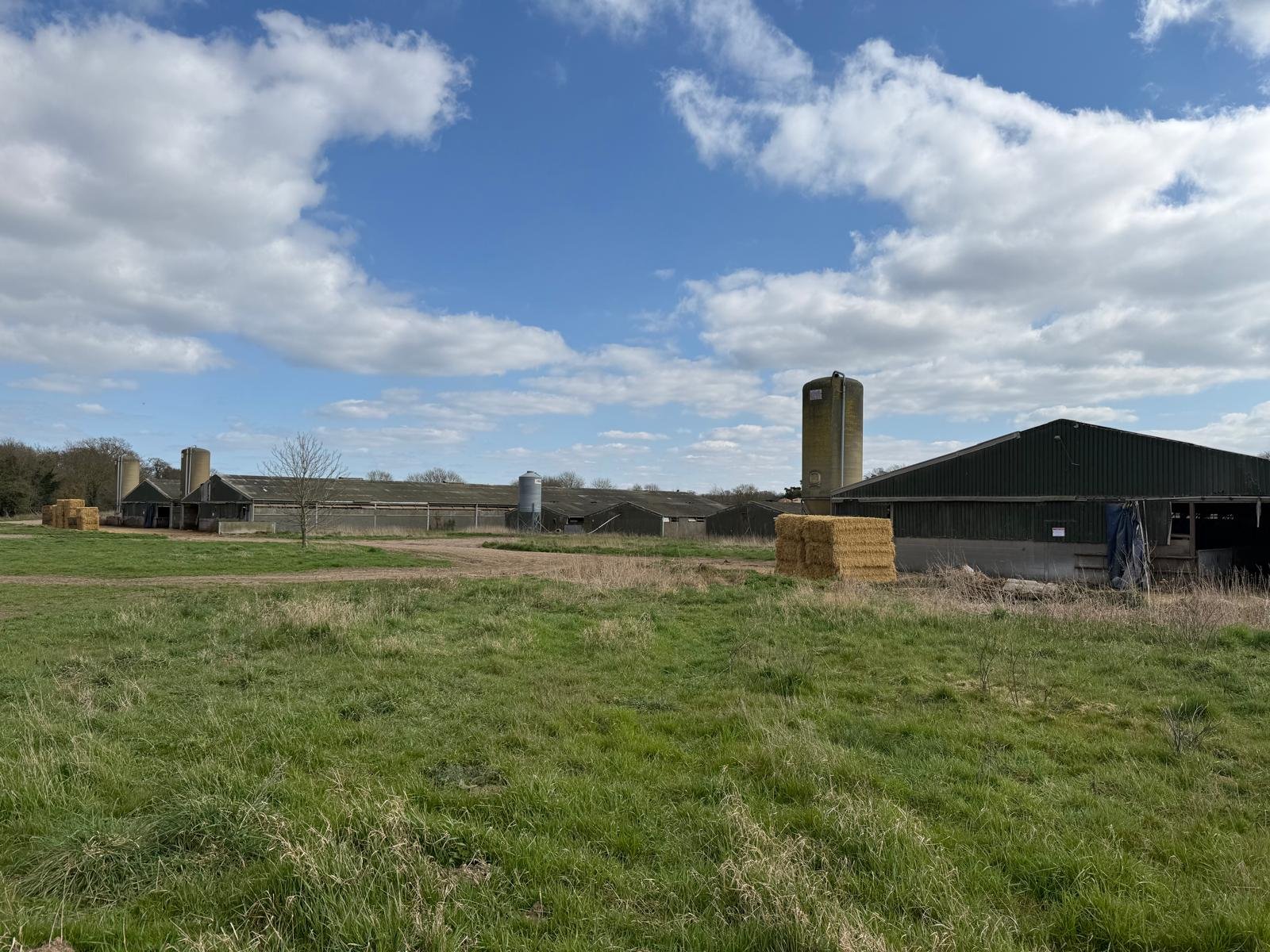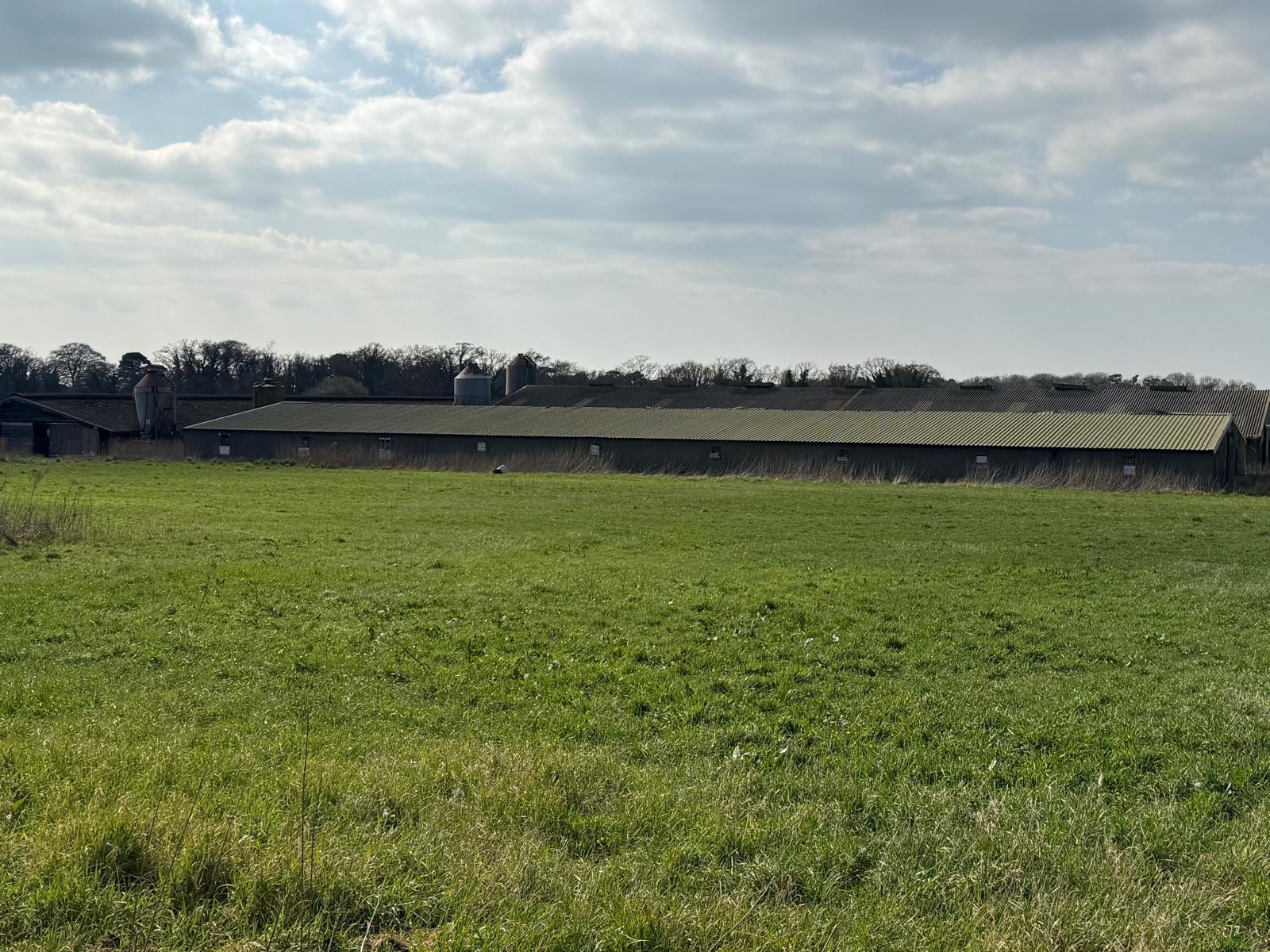METHWOLD AND FELTWELL FARM REDEVELOPMENTS
The UK is not self-sufficient in pork and chicken. Cranswick’s proposal for redevelopment at Methwold and Feltwell will help secure the supply for increasing demand of sustainably produced British meat.
These proposals are all about producing more British food, to higher welfare standards, through the redevelopment of existing farms.
PROPOSALS AT A GLANCE
Cranswick purchased the farms in 2018
Redevelopment of an existing pig farm and redundant poultry sheds.
Livestock has been reared on site since the 1960s.
The site is currently permitted by the Environment Agency to house 29,000 pigs. The proposal
reduces this to 14,000 pigs reared to RPSCA Assured standards.
We will build 20 state-of-the-art poultry sheds each housing 35,700 chickens reared to standards exceeding current Red Tractor accreditation.
Farms are located 1.5km away from Methwold and 1.7km away from Feltwell.
Access through a new private road and access points for an average of nine lorry movements a day.
PURPOSE OF THE PROPOSED DEVELOPMENT
The Government is working towards a new National Food Strategy to ensure a food system that backs British food, grows the economy, feeds the nation and protects the planet, now and in the future.
At a time of rising prices, trade wars and escalating international tensions, now is the time Britain needs to produce more food at home, using modern, efficient and sustainable forms of farming.
Not doing so will have a detrimental impact on UK economic growth, on food prices for consumers locally and nationally and on direct and indirect employment opportunities, within Norfolk and across the wider UK.
In East Anglia, Cranswick employ almost 3,500 people in both agricultural and manufacturing roles. The redevelopment creates 12 new direct jobs but is also critical to securing wider job opportunities within Cranswick and within the regional supply chain.
REASON TO REDEVELOP #2:
Sustainably producing higher welfare pigs and chickens
A major factor behind this application is the demand from UK consumers, campaigners and our own customers to ensure higher welfare standards for British pigs and poultry. In particular, many campaign groups have long called for more room to roam for chickens reared in the UK, providing more space and reduced stocking densities.
We have changed how we rear all of our British chickens on our farms – lowering the number of chickens housed in a unit by 20% compared to the Red Tractor standard and increasing the space available for the chickens to roam. The purpose of this site is to provide the additional capacity f or that commitment.
In addition, Cranswick is the only UK poultry producer to invest in the ‘NestBorn’ system. This means 100% of our chickens are born in the barn, rather than at a hatchery facility and are therefore not transported as live birds. They are born with instant access to feed, water, space and natural light improving welfare standards.
Meanwhile, all pigs at the farm will be reared to RSPCA Assured Standards, beginning their lives outside, before moving into the new straw-based barns.
In these ways and others, the site is designed to deliver on our commitments to support animal welfare and protect the environment, as set out in our Second Nature sustainability strategy. Through this work, we have been able to ensure that:
• Independent carbon footprint analysis of Cranswick’s broiler chickens is 32% lower than the UK industry average and the carbon footprint of Cranswick pigs is 54% lower than the UK industry average.
• Cranswick pigs and chickens are fed on UK-grown wheat, which is the largest part of the diet.
• We have reduced the amount of soya in the pig’s diet from 18% to under 10% since 2020; we are constantly looking for alternatives to reduce the soya inclusion within the chicken’s diet.
• All soya sourced is certified 100% deforestation free.
THE THREE MAIN REASONS FOR THE PROPOSED REDEVELOPMENT:
REASON TO REDEVELOP #1:
Improving productivity on agricultural land
A farm has been running on this site since the 1960s and part of the site at Feltwell is already operational as a pig farm, with a permit to house 29,000 animals at any time.
Our proposals are to house less than half that number of pigs and 714,000 chickens in newly built and more sustainable housing. The farmland on the Methwold site is currently home to old pig sheds which we will redevelop into higher welfare, bio-secure poultry barns. We will also bring the o ther sheds on the Feltwell site up to the very latest standards of modern pig farming and production.
Although we will be investing significantly in the sites to deliver these improvements, the new farm will not look particularly different to other farms which can be seen across Norfolk.
Each individual building is a standalone unit, similar in size to those used in farms across the region, but with investment to deliver industry leading sustainability.
Images of current Airfield and Feltwell site
Images of current Methwold site
REASON TO REDEVELOP #3:
More British food and stronger UK Food Security
The additional context for this application is the urgent need to improve UK food security, following years of rising prices and challenges with the UK food supply chain.
Currently, only 50% of the pork we eat is produced in the UK and 30% of all the chicken we consume is imported – much of which is produced to lower standards of animal welfare and creates far higher levels of carbon emissions than domestic produce.
The past five years have demonstrated what a risk this is for the welfare and security of our nation. Farms such as the ones we are proposing can help to reduce this risk, providing a sustainable supply of affordable, quality, more environmentally friendly food for the UK. A major British retailer has just announced that they will start sourcing fresh European chicken due to limited availability of British products.
The focus of all of Cranswick’s farms is on feeding the UK consumer; we export those parts of the pig which we do not eat in the UK and this helps to keep prices lower for UK consumers.
The proposals we have put forward can help secure the UK’s own food production, making us less reliant on imports and susceptible to challenges across the globe. We can produce higher welfare food at home that is affordable, quality and more environmentally friendly, while being considerate of the communities around us.
Images of piglets on straw-based and chicks born through the ‘NestBorn’ system
50%
OF PORK CONSUMED IN THE UK IS IMPORTED
30%
OF CHICKEN CONSUMED IN THE UK IS IMPORTED
FUTURE INFORMATION ON OUR PROPOSAL
IMPRESSION OF FELTWELL ON COMPLETION
IMPRESSION OF METHWOLD ON COMPLETION
ABOUT CRANSWICK
Cranswick has been a Norfolk employer and landowner since 2009 and the local farmers we work with have been farming the land here for decades. We employ almost 3,500 people across East Anglia.
Cranswick supply the UK’s supermarkets as well as leading food service operators and other food manufacturers, with products ranging from fresh pork and chicken to Gourmet sausage and bacon, cooked meats and premium pastry products. The business also has a large Mediterranean foods business, sourcing a wide range of charcuterie meats as well as olives and anti-pasti products.
Cranswick has developed a unique agricultural supply chain which involves milling animal feed and managing pig and poultry farms across East Anglia, the Midlands and the North of England.
FURTHER INFORMATION
-
The site we have chosen outside Feltwell is an operational pig farm, currently home to 7,500 pigs. There is an existing permit from the Environment Agency for 29,000 pigs on this site. Our proposal is to redevelop the existing farm and house 14,000 pigs, in new purpose-build barns.
The pigs will be reared to RSPCA Assured Standards, beginning their lives outside, before moving into straw-based barns. The redeveloped pig farm is located 1.7km from Feltwell and no transport will go through the village.
-
We are proposing brand new purpose-built poultry barns to provide higher welfare chicken on land where former pig sheds stand.
This site will allow us to rear higher welfare chicken, with 20% extra space compared to the industry Red Tractor standard.
All Cranswick poultry is Red Tractor assured, but we go beyond that by lowering the number of chickens per shed and the use of ‘NestBorn’.
This move to lower density will be completed in 2025 for all Cranswick poultry farms and forms part of this proposal. The proposed poultry site is just over 1.5km from Methwold.
-
It is not uncommon to see these kinds of farms close to each other in areas of livestock production and is common practice in the region.
To ensure optimum biosecurity, the poultry and pig units will be staffed separately, each having their own bio-secure zones.
-
Norfolk is already home to over 1 million pigs, 26% of the national herd, spread across hundreds of farms. The proposals we have put forward are not dissimilar to farms already operating in the local area, or who have recently had approval to develop, such as the poultry farm in nearby Brookville which received approval to increase capacity from 140,000 to 360,000 birds. The True Hill Farm is located under 250m away from Brookville, in closer proximity to residential properties than either of our sites.
-
We have considered the route of farm traffic to minimise the impact on these villages, with no traffic travelling through Feltwell due to the development of new access points and a private road. No issues have been identified by the Highways Agency or the Council highways office in relation to these traffic plans.
There will be on average nine lorry movements a day over the whole year. These lorries will enter and exit the site on the B1112 on Lodge Road and new access points and private roads will be built.
This has been designed to minimise traffic disruption and to ensure road safety at all times. There will be a small increase of 3-5% in the average maximum daily traffic movements.
Traffic counts have been completed considering the present total traffic flows and the effects of the proposed additional flows. The impact of the proposed traffic flow was low and the Highways Agency have not identified any cause for concern.
Additionally, Council highways officers have reviewed the plans and accepted the proposals.
-
We are aware of local concern about the impact on waterways and have met all requirements to provide information about the environmental impact of the sites. The proposed farm is situated on very light free draining land, which will limit any flood risk.
All solid and liquid waste from the sites is captured and managed in line with Environment Agency regulations.
This also means that there will be no ammonia contamination of our local water supply. All waste streams will be removed from site and processed in line with the Code of Good Agricultural Practices (COGAP) and Nitrate Vulnerable Zones (NVZ) regulations. Additionally, the poultry houses will be fitted with industry leading air scrubbers which remove almost all of the ammonia from the air before it leaves the buildings, heat recovery systems to reduce gas usage and solar PV to generate electricity.
-
All of Cranswick’s pigs and chickens are fed on UK grown wheat, which is the largest part of the diet and for the small amount of soya used it is certified 100% deforestation free. This has resulted in a 28 per cent reduction in the carbon footprint of our chicken farms. We have worked to reduce soya inclusion in the pig’s diet from 18% to under 10% since 2020. We are constantly looking for alternatives to reduce the soya inclusion within the chicken’s diet.












